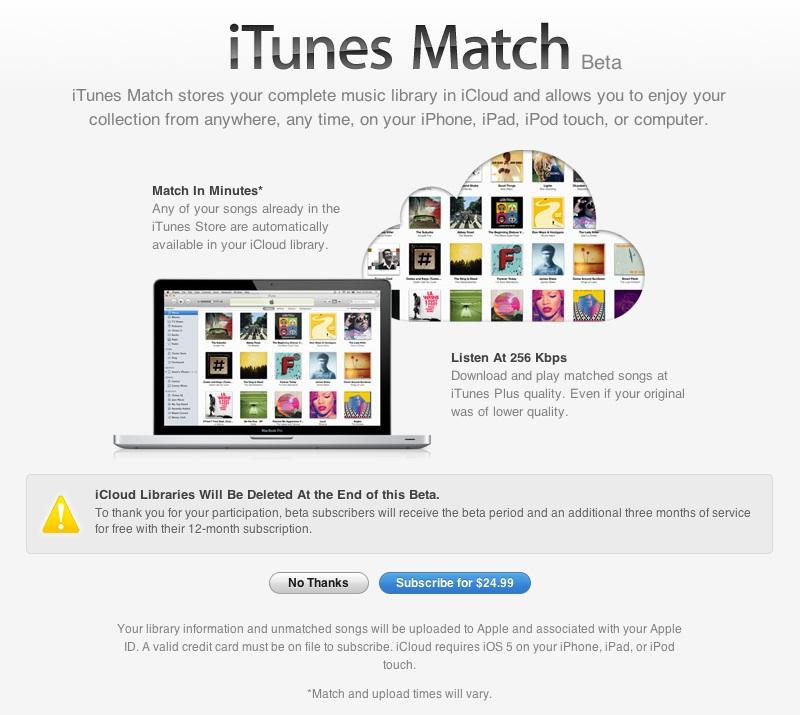Despite evidence that appears to show streaming playback through iTunes Match, an Apple spokesperson confirmed to Peter Kafka of All Things D that content played from the service must first be "stored" on an iPhone or iPad. The service appears to be streaming because it begins playback instantly, but instead of true streaming it is downloading and storing the file while beginning simultaneous playback.
"Apple's system, as it's currently constructed, still requires users to keep stuff on their machine in order to play with it," the report said. Kafka speculated that files that are not "downloaded" through iCloud but still played will sit in a "temporary cache" on the machine.
It's unknown whether the files stored locally are of full quality or reduced bitrate, or how large the cache of content can grow, making it unclear whether the lack of true streaming is essentially a matter of semantics for the end user. Apple has been "deliberately vague" about how the iTunes Match service works.
The lack of true streaming is not a result of licensing hold-ups with record labels. Those licenses were said to have been acquired in April.
Sources in the industry reportedly confirmed to Kafka that although Apple does have the rights to streaming music, the decision to require files to be downloaded, albeit to a temporary cache, is a "philosophical/design" decision made by Apple.
"Part of it is that Apple doesn't trust the current telecom ecosystem to handle on-demand streaming of library files every time someone wants to use them — look how much trouble AT&T has had with the iPhone to date," the report said.
"But the other part is that Apple wants its users to think of entertainment as something they consume on an Apple device — as opposed to the Google and Amazon approach, which is supposed to let consumers grab anything they want on any device, using a browser."
Apple's approach has apparently been used to provide users with "great playback experience." The source reportedly said that Apple is "not interested" in replicating versions of cloud music that are offered by Google and Amazon.
The iTunes Match beta was issued to developers on Monday, and it allows users to replicate their music library in the cloud, matching it with content available from iTunes. When it launches this fall, iTunes Match will cost $24.99 per year.
 Katie Marsal
Katie Marsal




-xl-m.jpg)


-m.jpg)






 Malcolm Owen
Malcolm Owen
 William Gallagher
William Gallagher
 Mike Wuerthele
Mike Wuerthele


 Thomas Sibilly
Thomas Sibilly
 Wesley Hilliard
Wesley Hilliard
 Marko Zivkovic
Marko Zivkovic








47 Comments
Then why is there a download button next to the song, and why does iTunes TELL me it is an audio stream?
I think she doesn't know anything about it besides what they explained in the keynote months ago.
Who cares?
Can someone clarify the technical difference here for me??
It seems like splitting hairs to me. It saves a cache file, so it's not streaming? So what? How is that not still streaming if it plays at the same time as you download a cache file??
Isn't it basically the same as a buffer?
Can someone clarify the technical difference here for me??
It seems like splitting hairs to me. It saves a cache file, so it's not streaming? So what? How is that not still streaming if it plays at the same time as you download a cache file??
Isn't it basically the same as a buffer?
I guess the distinction they're making is that a buffer is in memory and this cache file is on disk, so the architecture is slightly different. It kind of makes sense that they would do it with a cache because these devices are generally memory starved (it keeps power consumption down) but have lots of hard disk space.
Ultimately, it makes no difference to the end user. The authoritative version is stored on the server. The cache file can be deleted as desired by the system.
The new iTunes Match beta still downloads songs and saves them locally on a user's device, rather than providing an absolute true streaming service.
[ View this article at AppleInsider.com ]
Good. That's exactly how I want it. The majority of the music that I want to listen to is on my iDevice already anyway; I just want to be able to access my entire library on the fly if needed.